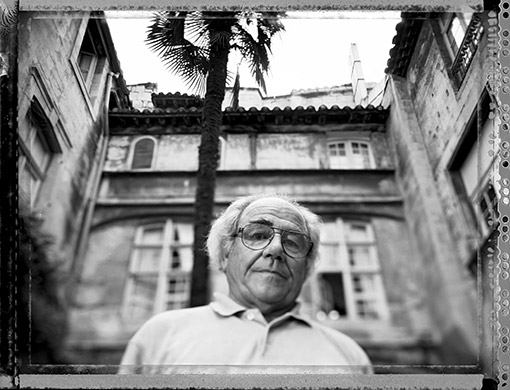 In the first two seasons of the Showtime drama Homeland (SPOILERS for the first two season of Homeland, btw), CIA officer Carrie Mathison (played by Claire Danes) tries to prove that a United States Marine named Nicholas Brody (played by Damian Lewis) has become a terrorist following his release from years of imprisonment and torture by Al Qaida leader Abu Nazir in Iraq.
In the first two seasons of the Showtime drama Homeland (SPOILERS for the first two season of Homeland, btw), CIA officer Carrie Mathison (played by Claire Danes) tries to prove that a United States Marine named Nicholas Brody (played by Damian Lewis) has become a terrorist following his release from years of imprisonment and torture by Al Qaida leader Abu Nazir in Iraq.
In contrast to Hatufim (English title Prisoners of War), the original Israeli television series on which Homeland is based – which was more concerned with the psychology and trauma of the former hostages and their families – Homeland focuses at least equally on the strategies and processes used by Matheson and her CIA colleagues in their attempts to prove that her double-agent theory about Brody is correct.
Homeland’s pilot episode has Matheson, unable to convince her CIA boss to allow her to set up surveillance cameras to watch Brody’s behaviour, illegally wiring up his house for observation anyway and subsequently spending most of her available time clandestinely peeping at him and his family. From that point on, one of Homeland’s primary tropes and concerns is the nature and implications of seeing and being seen, and particularly being recorded.
You might think that this would be a perfect opportunity to critique the so-called surveillance state in America and its ostensible motivation: to root out crime, especially terrorism. Of course the foremost analysis and attack on this idea – of an omnipresent human organization empowered to watch and judge our every move – is French theorist Michel Foucault’s description of the panopticon, a hypothetical prison design conceived by philosopher Jeremy Bentham, constructed with a central tower from which a guard can view the entire structure and all its occupants but which guard cannot be seen himself. The idea is that whether or not anyone is actually inside the tower watching, prisoners will always know that they could be observed which, the theory goes, will prevent them from doing anything that’s against the rules.
Wish you were here.
Foucault’s invocation of the panopticon as an apt analogy for the structure of modern societies which he says seek to impose and enforce their own hierarchies of power by creating in its citizens an awareness that someone is always watching, so that people always and only enact the scripts provided to them by social and legal expectation according to their political condition – to “know their place” and never stray from it.
Foucault is much-revered and much-quoted by the kinds of people who like to revere and quote people like Foucault, and with a television series so preoccupied with the ideologies and realities of surveillance and terrorism as Homeland, the obvious thing would be to dramatize Foucault’s analysis – or else to be a kind of propaganda tool of the reactionary corporate media, to work to redeem it. But Homeland does neither of these. In fact, it does something much more interesting: it takes on Foucault by bringing to bear an equally impressive theorist’s own anti-Foucaultian polemic, recontextualizing the whole discussion in terms of the real, practical functioning of the power of observation in terms of The Law against The Criminals.
Ladies and gentlemen, I give you Jean Baudrillard!

He can see you.
Baudrillard was a philosopher and theorist who was most interested in the epistemological gaps that exist between ineffable reality and what’s apparent to our senses and intellect. His book, Simulacra and Simulation, notably appeared in The Matrix, though Baudrillard himself said that the movie drastically misunderstood his arguments.
In 1976, following the publication of The Will to Knowledge, the first volume of Foucault’s treatise on repression and capitalism and stuff like that, The History of Sexuality, Baudrillard composed a scathing, almost vicious (and actually pretty funny) critique titled Forget Foucault. In it, Baudrillard accuses Foucault of basically having missed the boat completely; he argues that if Foucault’s characterization of the discourse of power was ever correct, it must have been a very long time ago. It certainly was nowhere close to correct at the time of publication, and was actually nothing more than Foucault’s own attempt to insert himself into the discourse of power as he (inaccurately) understood it – not an exposéat all but a desperate and obfuscating grab for precisely the kind of repressive authority he claimed to be revealing. It was a bit similar to Joseph Heath and Andrew Potter, authors of The Rebel Sell, claiming that Naomi Klein wrote No Logo in order to regain the social capital (read: street cred) she feared she was losing when the genuine factory lofts in her neighbourhood were starting to be bought by developers and transformed into the much less cool loft condominiums. Almost twenty years later, echoing Baudrillard, the controversial but always candid feminist writer and critic Camille Paglia described The History of Sexuality as an ignorant, ahistorical disaster.
Anyway, what does all this have to do with Homeland? In strikingly Baudrillardian tones, the discourse of power vis-à-vis surveillance in Homeland is the almost total inverse of Foucault’s diagnosis of the panoptic society; the CIA’s power comes completely from hiding its own observational capacity, whereas Nazir’s terrorists derive their power not just from revealing power structures but from their public performance of them.
For Foucault, power consists in discourse – in the production of narratives and belief structures. Baudrillard calls this description hopelessly passé. For Baudrillard, power consists entirely in concealment, in dissimulation – in hiding the fact that power is only an illusion. Homeland here sides entirely with Baudrillard.
For most of Homeland’s first season, Carrie Mathison is convinced that Nick Brody is secretly a terrorist. And they key word here is secretly: Brody’s power over Mathison, the CIA, and America in general, is completely tied up in the fact that his true beliefs and intentions are concealed. And what Mathison does is create her own zone of concealment: she secretly begins watching and recording Brody. Both of these antagonists power is one hundred percent reliant on the fact that the other not know their true state of mind and, to a lesser degree, their behaviours. And their goals are explicitly to expose the other – the CIA operative wants to reveal Brody’s true allegiance as being to Nazir and Al Qaida, whereas the terrorist’s plan is to blow up as many high-ranking American officials as possible.
Ah, but wait – that doesn’t sound much like a goal of concealment, does it? A suicide bombing is obviously a performance, its target is not only the destruction of human lives and property but the sowing of fear, the production of a belief structure. And that’s very true. In fact, the terrorists’ ideological position with regard to the mechanism of obtaining power is largely Foucaultian (at least on its surface – we’ll get back to that), whereas the Americans’ is almost entirely Baudrillardian. When one character or another shifts from a position of power as performance (Foucault) and power as concealment (Baudrillard), or from the latter to the former, that event tends to be a major plot point in the narrative arc of the show – a gamechanger.
The moment that Brody discovers the CIA suspects he is a terrorist is the moment he gains a new level of power over the CIA and Carrie Mathison – it’s the very same moment that convinces Mathison that Brody is innocent. The hidden cameras in Brody’s house end up revealing nothing particularly incriminating; the dissimulation succeeds and the CIA’s observation fails.
Later, two other recordings also play vital power-shifting roles in the plot of the show. Brody (who actually really is working for Nazir) records a video of himself describing all the reasons that he is about to do what he’s about to do: i.e. detonate a suicide bomb in the Vice President’s safety shelter (killing the VP and many other American officials, as well as himself, of course) following a diversionary sniper attack at a public event in Washington. Note that the performance of the sniper attack (meant to look like a failed assassination attempt on the Vice President’s life) is in fact itself only a further act of concealment – Brody is meant to be rushed to the Vice President’s shelter with the other officials, where he can detonate the bomb. The recording that Brody makes – his “confession” – is purely Foucaultian: it’s designed to be the performative act of disrupting the American narrative to promote Al Qaida’s, even moreso than the intended terrorist attack itself. The goal is to make American’s wonder why anyone would do such a thing, and provide the answer, which is, from Brody’s (and Al Qaida’s) perspective: because you deserved it.
The plan fails, however, when a phone call from his daughter (prompted by Carrie Mathison’s going to Brody’s house to try to reveal what she now knows – that Brody is working for Al Qaida) convinces him not to go through with the attack. Later, after telling Nazir that the vest malfunctioned, Brody returns to the spot where he had hidden the flash drive with his confession video (which was to be taken by another terrorist operative and sent to the media following the attack), only to find it missing. Now that Brody is known for a fact by Mathison and her team (but not to his family or the public) to be a terrorist, the existence of the confession is Al Qaida’s greatest weapon against him – after he is compelled to work for the CIA instead, now a triple agent. Brody’s voluntary self-exposure has the capacity now to utterly undo him – as it will actually go on to do.
The other piece of video that’s central to Homeland’s discourse on power is footage that reveals precisely what the terrorists want to come to light: that the Vice President had ordered a drone strike some years before that killed 82 children in an attempt to kill Abu Nazir. Despite the fact that he was warned that Nazir’s presumed location was near a school, the VP decided that the risk was worth it – the children, of course, were not the target, but ended up as the victims. And Nazir was not harmed. This, in fact, was the event that turned Brody to Al Qaida’s side in the first place; Nazir had set up his prisoner Brody as an English tutor for Nazir’s young son. Brody, over time, grew to love little Isa Nazir, and when Isa was killed in this drone strike, Brody became convinced that America was the bad guy rather than Al Qaida – he had assented to Nazir’s narrative, and it was the performance of an action by America that tipped that particular scale. The video of that decision being made would have likely done more damage to America’s narrative than the intended murder of the Vice President – and Baudrillard has something to say about that phenomenon as well.
He argues that in some sense, actually detonating a bomb is not as serious as simulating a bomb (and it’s not a coincidence that the word “bombshell” also holds the figurative meaning of newly revealed information with shocking and disruptive effects). While the simulacrum of a bomb doesn’t cause property damage or loss of life, it does explode the barrier between images and reality. “But,” he explains, “power can’t behave as if this is the case, because admitting it threatens to alert the public that perhaps law and order themselves might really be nothing more than a simulation.” The threat of exposure, of making known the fact that America chose to risk the lives of dozens of innocent children on the chance that they could eliminate a terrorist with a great deal of blood on his hands, would have been a more effective bomb than the actual bomb that Brody strapped to his body.
But of course Al Qaida are not going after this video, perhaps wouldn’t have gone after it even if they’d known it existed. Knowledge of the video is only used as leverage by Carrie Mathison’s boss against the head of the CIA and the Vice President. What does end up happening is that the terrorists rig up a car bomb that goes off at a memorial service in Washington, killing the majority of the Defense and Homeland Security Departments and their families – by this point Brody is thoroughly reformed and solidly back on Carrie Mathison’s side, which Al Qaida knows. Which is why they take this opportunity to leak Brody’s confession video. Despite the fact that Brody had absolutely nothing to do with the attack and had no knowledge of it, Al Qaida makes it seem as if Brody (who, along with Carrie Mathison, survived the attack) was responsible for it.
What’s very important here from the Baudrillard versus Foucault perspective is that disseminating the confession video at that point did not in fact reveal a dissimulated truth. Brody’s previous performance had by now “expired.” Allowing America to believe that Brody was a traitor – which is what the CIA had previously wanted, back when Brody still was a traitor – didn’t reflect the current reality at all anymore, it was pure narrative-production; it was Al Qaida’s attack on Brody himself, who had betrayed them, but it also served to dissimulate the true nature of the event: everyone now believed that Brody had detonated the car bomb, so no one was looking for who actually had done it. But this was a secondary concern, “collateral damage,” as it were. The real target was solidly America’s (and Brody’s) narrative. And the weapon, the power, was in the performance.
So we see that in Homeland we do have two narratives competing for primacy. But the methodologies of the discourse of power are very different for the CIA and for Al Qaida. The terrorists perform – they need, in a Foucaultian way, to create by their actions a panopticon wherein America is the prisoner who is fully conscious that what they do is being noticed, recorded, and judged. That’s where Homeland’s terrorists’ power derives from, almost entirely. But for America, the CIA, Carrie Mathison – the good guys (not unflawed, but generally on the side of the angels) – the performativity of the discourse of power is strictly passé. It’s not the performance of power but the generation of layers upon layers of obfuscating simulacra, the obscuring image that conceals the absence of at its core which Baudrillard identifies as the only seat of power, that is America’s ideological strategy.
Forget Foucault, says Homeland. The real power of power is in privacy.


I haven’t watched more than an episode of Homeland, but I have a couple of questions:
1) The buzz I’ve heard about the show is that season one is great, and then it goes violently off the rails. Do you tend to agree?
2) If so, do you think this has anything to do with the shift from a show about covert observation to a show about simulation and performance?
1. I think that the first season was the high point. The second season was still strong but had one or two weaker subplots. The character of Brody was intended to be killed off at the end of Season 2 in the attack. However the network felt that the dynamic between Brody (Damien Lewis) and Carrie (Claire Danes) was too strong to lose right away and asked that he survived the attack. As a result Brody is on the lam for a good portion of Season 3, which isn’t the most interesting of stories and doesn’t make the best use of the character. However -without giving spoilers- the end of the third season was a game changer. So it’s anyone’s guess what the future will be like for the characters and the show.
2. I think that it was never only about covert operations or only about simulation and performance. It was and is about the combination of the two. In the first season Brody is hailed as a hero with Carrie being the only one who doesn’t believe him. She has reason: a source told her that an American POW had been turned by Al Qaida. At the time she didn’t know of any American POW’s (Brody was long presumed dead) but when he comes back she suspects that he is the one that her source was talking about. Brody takes on the hero role in the eyes of the nation. Meanwhile Carrie’s history of erratic behavior (she keeps her bipolar disorder secret from the agency but symptoms of it sometimes cause problems in her work) means that the agency doubts her. So she pretends to the agency that she’s NOT following Brody. She also strikes up a relationship with him under false pretenses. At the end of the first season Carrie is institutionalized and undergoing electro-shock therapy. She’s stopped a major terrorist attack but she doesn’t know it.
In the first season Carrie was determined to convince others she wasn’t insane. At the beginning of the second season her job is to convince herself. Really in Carrie’s mind there are layers of simulation and performance. At the beginning of the second season she tells her mentor Saul that she has never been so sure of anything or so wrong about it. If she can be that wrong, then how can she ever trust herself? It’s observation that restores her trust. Saul finds Brody’s confession video and shows it to her. Carrie is the one to apprehends and interrogate Brody in the following episodes, eventually turning him into a double agent. Brody can tell his wife and kids nothing other than the fact that he’s helping the CIA. So he’s playing a role there as well. Carrie has a more open relationship with Brody and her colleagues but Brody’s relationship with his family has taken on that simulation and performance.
Those themes of observation vs. simulation and performance continue into the third season. POTENTIAL SPOILERS FOR SEASON 3: Following the terrorist attack, Brody is assumed to be guilty because his confession tape was released. Carrie knows he’s not but is again in the position of not being believed. She’s also covering up the fact that she helped Brody escape following the attack. Meanwhile she has an assignment that requires her to simulate and perform even more in order to make another terrorist believe that she can be turned. Observation occurs as well towards the end of the season, when Brody is used as a CIA asset again with very public consequences.
Since the theme runs throughout the series I don’t think it’s the reason for the less enthusiastic response to the 2nd and 3rd season. Rather I think the increased focus on Brody’s family life was a problem since they weren’t the most interesting characters. His character did need to perform and simulate for them but that doesn’t mean his teenage daughter’s issues were great viewing! I also think that Brody should have died in the second season as planned since his character had little to do until the final three or four episodes of the third season
But while there are a few missteps it’s still one of the best acted shows on television. Claire Danes, Damien Lewis and Mandy Patankin consistently impress as characters whose agenda isn’t clear even to themselves. It’s also timely in that it poses questions about current events in a thoughtful manner. The CIA is depicted as the good guy in general but they have blood on their hands. How far do they go in trying to protect the country from terrorists before they’re guilty of the same crimes? How do they have honest relationships with anyone when they can’t share the truth about what they do- even when that takes a tremendous personal toll? What motivates someone to serve their country to that extent and what can drive someone to turn against it? I would say it’s very much worth watching in spite of its imperfections.
I think that it was never only about covert operations or only about simulation and performance. It was and is about the combination of the two. In the first season Brody is hailed as a hero with Carrie being the only one who doesn’t believe him. She has reason: a source told her that an American POW had been turned by Al Qaida. At the time she didn’t know of any American POW’s (Brody was long presumed dead) but when he comes back she suspects that he is the one that her source was talking about. Brody takes on the hero role in the eyes of the nation. Meanwhile Carrie’s history of erratic behavior (she keeps her bipolar disorder secret from the agency but symptoms of it sometimes cause problems in her work) means that the agency doubts her. So she pretends to the agency that she’s NOT following Brody. She also strikes up a relationship with him under false pretenses. At the end of the first season Carrie is institutionalized and undergoing electro-shock therapy. She’s stopped a major terrorist attack but she doesn’t know it.
The other piece of video that’s central to Homeland’s discourse on power is footage that reveals precisely what the terrorists want to come to light: that the Vice President had ordered a drone strike some years before that killed 82 children in an attempt to kill Abu Nazir. Despite the fact that he was warned that Nazir’s presumed location was near a school, the VP decided that the risk was worth it – the children, of course, were not the target, but ended up as the victims. And Nazir was not harmed. This, in fact, was the event that turned Brody to Al Qaida’s side in the first place; Nazir had set up his prisoner Brody as an English tutor for Nazir’s young son. Brody, over time, grew to love little Isa Nazir, and when Isa was killed in this drone strike, Brody became convinced that America was the bad guy rather than Al Qaida – he had assented to Nazir’s narrative, and it was the performance of an action by America that tipped that particular scale.
She has reason: a source told her that an American POW had been turned by Al Qaida. At the time she didn’t know of any American POW’s (Brody was long presumed dead) but when he comes back she suspects that he is the one that her source was talking about. Brody takes on the hero role in the eyes of the nation. Meanwhile Carrie’s history of erratic behavior (she keeps her bipolar disorder secret from the agency but symptoms of it sometimes cause problems in her work) means that the agency doubts her. So she pretends to the agency that she’s NOT following Brody
Carrie being the only one who doesn’t believe him. She has reason: a source told her that an American POW had been turned by Al Qaida. At the time she didn’t know of any American POW’s